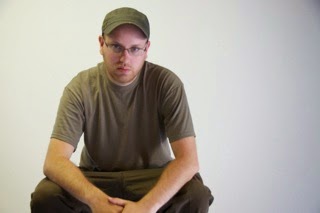Steven Leonardo Clifford
Age 29
Long Island, New York.
In terms of my education, I took as many English literature classes as I could afford at my community college.
The Writer
How long have you been writing?
I’ve been writing since before I could remember.
Do you have a specific writing style?
My poetry’s been called “screenplay-poems,” meaning I usually write out a piece as if it’s a scene in a script. This is the most natural way for me to write. It’s as if I’m transcribing from memory or dreams. Being a poet, I can take liberties with surrealism and incorporate abstract language in visuals.
What is your ultimate goal as a writer?
My ultimate goal is to write an everlasting piece like “The Wasteland,” with T.S. Elliot’s spirit and audacity in my own way. Also, that my work stands beside the greats in the library. I believe poets shouldn’t only write for themselves and their readers but history as well.
What is your greatest challenge as a writer?
I try to gain a sense of transcendence through poetry. The challenge is conveying that to others, so they will feel transcended upon reading my work.
The Work
Tell us about your work in Crack the Spine.
“Pocket Paths,” is about the speaker’s struggle to breakout out of his world.
Is there a main theme or message in ‘Pocket Paths?’
This piece has many little themes in it, but at its core the theme is about how we’re so engrossed in our superficial lives and surroundings that we rarely experience something beyond or deeper within ourselves.
What inspired this piece?
With this piece, inspiration was involved but no inspired thing. The words themselves inspired me as they appeared by working from a magnetism inside myself that attracted the will to write. I don’t always wait around for something to inspire me.
Tell us about another project you have published or are currently working on.
I’m in the final stages of my chapbook titled, ‘Lost Children.’ It’s very reminiscent of ‘Pocket Paths,’ actually. It has a hallucinatory feel in the text. But in ‘Lost Children,’ there are multiple dimensions to the narrator that are embodied in separate characters. They all seem unrelated at first but there are hints to suggest they are one. As the reader reads on he/she sees them aligned into a new person, a metamorphosis.
What inspired ‘Lost Children?’
I found the inspiration from within, a sort of self-induced inspiration from an insatiable ambition. I just knew I wanted to write something epic so I drew from the richest material I had in my pocket: my dysfunctional yet beautiful childhood.
When can we find this work?
That’s yet to be known. I’m currently looking at publishers and preparing query letters.
The Methods
How often do you write?
I write everyday, but I don’t trek on mindlessly. I try not to be completely satisfied with my work and abilities on a daily basis. That way I avoid complacency.
What are your thoughts on self-publishing vs. traditional publishing?
My argument concerning this debate has lots of gray areas. I think self-publishing has a stigma of poor creditability due to the fact that there’s no screening process to assess the manuscript’s quality. That’s kind of the point, though. It’s free for all, and unrestricted from outside preferences and ideals. However, it adds to the noise of the Internet. “Be known now, find a voice later” is the motto of the masses. I can understand why some venues only invite writers, which is to avoid mediocrity and seek out literary quality. That’s great for the individual but not for the many. Self-publishing is an alternative route, and an opportunity for people. If self-published writers have voices, take their time, proofread, and find an audience themselves; I say more power to them, but people might consider them as spam.
How many drafts do you generally go through before you consider a piece to be complete?
I wrestle through several drafts before a piece feels complete. I don’t only do a revision, but a reimagining. As if writing the poem is like constructing a house, I would enlarge the context from a house to a house within a town. Then I would include a new addition–– the town’s cable guy installs a satellite dish communing with the stars, and now I can stretch my creative legs: I can write in broadcasts of anything I want while the house is still within the boundaries of a town, and not a vacuum.
How do you react to editorial rejections of your work?
I can spot a rejection letter by the first word. Reading through it is like pulling off a Band-Aid, and then I’m fine.
What is your best piece of advice on how to stay sane as a writer?
What’s best is to rest periodically, and don’t always mentally record your thoughts for a future piece. Some thoughts are meant for your sole ownership, your own personal sentiment, not an imaginary reader.
The Madness
What is the greatest occupational hazard for a writer?
Mental fatigue.
What is your favorite word?
Malaise.
Who would play you in the film of your life?
River Phoenix.
What makes you laugh?
My own misfortunes.
What makes you cry?
Sunsets.
Cats or Dogs?
Cats
Beer or Wine?
Wine
The Beatles or The Rolling Stones?
Stones.
Additional Reading on Steven


excellent interview!
I appreciate Steven Leonardo Clifford’s courage and willingness to lay bare his truths, his lack of pretension and his whorls of imagination.
Stellar insights into the writer’s mind. Much enjoyed.